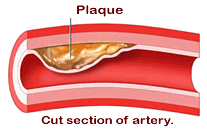Switching
to Atazanavir (Reyataz) Lowers Cholesterol and Triglycerides, but
No Improvement in Artery Function
 |
 |
 |
 |
 |
 |
 |
| SUMMARY:
Switching from another protease inhibitor to boosted
atazanavir (Reyataz) lowered blood cholesterol and triglyceride
levels in people with suppressed HIV in a 24-week study,
but did not improve endothelial (blood vessel) function
or reduce inflammation biomarkers, according to a small
study reported in the March
27, 2010 issue of AIDS. |
|
 |
 |
 |
 |
 |
 |
 |
By
Liz Highleyman
People
with HIV are at higher risk
for cardiovascular disease
compared with the HIV negative general population, but it is not
clear whether this is due to long-term HIV infection itself, antiretroviral
therapy (ART), or traditional risk factors.
 Chronic
HIV infection can lead to ongoing inflammation, and some antiretroviral
drugs can cause metabolic changes
including elevated total and low-density lipoprotein (LDL) "bad"
cholesterol and reduced high-density lipoprotein (HDL) "good"
cholesterol. Both inflammation and metabolic abnormalities contribute
to atherosclerosis, or build-up of plaque in the arteries; dysfunction
of the endothelial lining of the arteries is an early step in
this process.
Chronic
HIV infection can lead to ongoing inflammation, and some antiretroviral
drugs can cause metabolic changes
including elevated total and low-density lipoprotein (LDL) "bad"
cholesterol and reduced high-density lipoprotein (HDL) "good"
cholesterol. Both inflammation and metabolic abnormalities contribute
to atherosclerosis, or build-up of plaque in the arteries; dysfunction
of the endothelial lining of the arteries is an early step in
this process.
Robert
Murphy and fellow investigators with the SABAR Study Team aimed
to determine whether the protease inhibitor atazanavir
-- which is known to be more "lipid-friendly" than other
drugs in its class -- would have a beneficial effect on arterial
function and other metabolic and inflammatory risk factors for
cardiovascular disease.
This
prospective multi-national trial included 50 HIV positive patients
receiving stable protease inhibitor-based ART with plasma HIV
RNA < 500 copies/mL. Inclusion criteria included elevated blood
lipids at baseline, with either fasting LDL levels > 130 mg/dL
or triglyceride levels > 200 mg/dL.
Most
participants (85%) were men. The median CD4 cell count was high,
at 499 cells/mm3. At baseline, the median total cholesterol level
was 204 mg/dL, median LDL cholesterol was 122 mg/dL, and median
triglyceride level was 244 mg/dL. People with uncontrolled diabetes,
high blood pressure, and > 1 pack/day smokers were excluded
(though nearly half smoked some).
Participants
were randomly assigned to either continue on their current protease
inhibitor -- usually lopinavir/ritonavir
(Kaletra) -- or switch to atazanavir
plus a boosting dose of
ritonavir (Norvir) for 24 weeks; 26 patients switched and
24 stayed on their existing regimen.
The investigators measured blood lipid levels, inflammatory and
metabolic biomarkers, and brachial artery (upper arm) flow-mediated
dilation (how well an artery responds to changes in blood flow)
at baseline, week 12, and week 24.
Results
 |
At
24 weeks, participants who switched to atazanavir experienced
significantly more favorable changes in blood lipid levels
than those who remained on the old regimen: |
| |
 |
Total
cholesterol: -25 vs +1.5 mg/dL, respectively (P = 0.009); |
 |
Non-HDL
cholesterol: -27 vs -0.5 mg/dL, respectively (P = 0.014); |
 |
Triglycerides:
-58 vs +3.5 mg/dL, respectively (P = 0.013). |
|
 |
However,
there were no significant changes in flow-mediated dilation
in either treatment group after 12 or 24 weeks. |
Based
on these findings, the researchers concluded, "In dyslipidemic
individuals with suppressed HIV RNA on stable therapy, changing
the protease inhibitor to atazanavir/ritonavir for 24 weeks improved
lipids; however, endothelial function, inflammatory, and metabolic
markers did not change."
Northwestern University Center for Global Health, Northwestern
University, Chicago, IL; ACLIRES Argentina SRL, Buenos Aires,
Argentina; University of Cincinnati, Cincinnati, OH; University
of Southern California Keck School of Medicine, Los Angeles, CA;
University of Modena and Reggio Emilia, Modena, Italy; University
of California-San Diego, San Diego, CA; SigmaClinical, Daglan,
France; University of Wisconsin School of Medicine and Public
Health, Madison, WI.
4/6/10
Reference
RL
Murphy, B Berzins, C Zala, and others. Change to atazanavir/ritonavir
treatment improves lipids but not endothelial function in patients
on stable antiretroviral therapy. AIDS 24(6): 885-890 (Abstract).
March 27, 2010.
